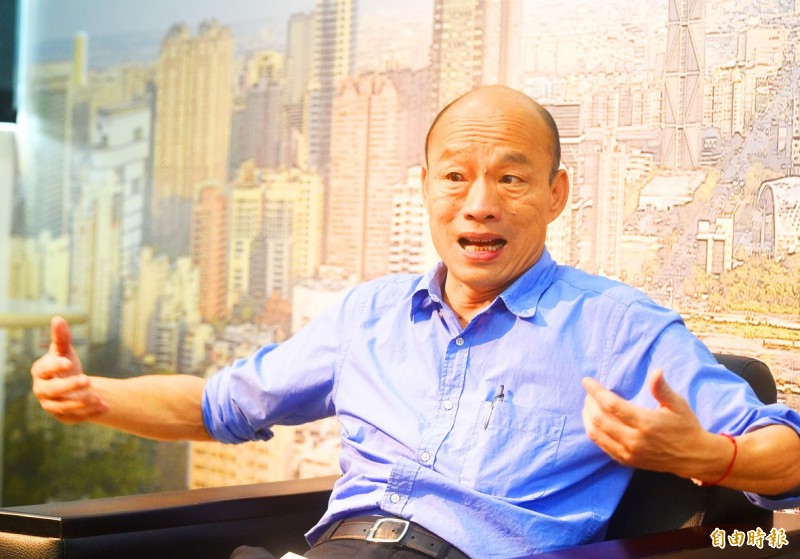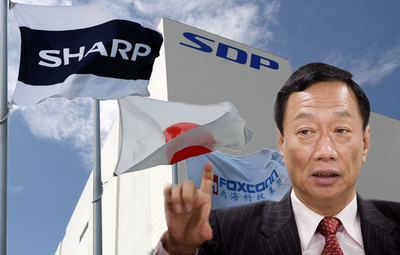《TAIPEI TIMES》Han Kuo-yu urges accountability in politics

Kaohsiung Mayor Han Kuo-yu gestures during an interview with Liberty Times reporters at his office on July 5. Photo: Chang Chung-yi, Taipei Times
In an interview with ‘Liberty Times’ (sister newspaper of the ‘Taipei Times’) reporters Wang Jung-hsiang, Ko Yu-hao and Chang Chung-yi on July 5, Kaohsiung Mayor Han Kuo-yu, who on July 15 won the Chinese Nationalist Party’s (KMT) presidential primary, expounded on his political views and said that he is the candidate that the Democratic Progressive Party is most afraid of
By Wang Jung-hsiang, Ko Yu-hao and Chang Chung-yi / Staff reporters
Liberty Times (LT): You have proposed having the president double as the premier and of working as president from Kaohsiung. These would be unconstitutional. Would you amend the Constitution if you became president?
Han Kuo-yu (韓國瑜): The current system has resulted in the phenomenon of those having authority not needing to shoulder the responsibility, while others possess no authority, but need to shoulder responsibility. Obviously this unbalanced situation has to be adjusted to make authority and responsibility correspond. Former premier William Lai (賴清德) previously proposed that Cabinet members should be chosen from the ranks of lawmakers.
I pitched these ideas so people can discuss then, although I do not think constitutional changes are likely. Amendments to the Constitution must to pass the high threshold of being ratified by three-quarters of the Legislative Yuan and a referendum. However, there are alternatives, such as making a newly appointed premier present their policy agenda to the legislature before the latter takes a vote of confidence on them.
Essentially, the premier would need the legislature’s seal of approval before taking office, which gives the position more legitimacy. Otherwise, the premier is merely the president’s chief of staff, to be summoned and dismissed at will.
President Tsai Ing-wen (蔡英文) has gone through three premiers so far; my television at home lasts longer than that. Premiers should not be disposable.
The president’s authority is clearly defined by the Council of Grand Justices Interpretation No. 627 as being in charge of national defense, diplomacy, cross-strait policy and the fundamental agenda of government. All other duties lie in the province of the premier as head of the Executive Yuan. The nation’s future president must find the character to get out of their premier’s way and to respect the constitutional framework of the political system.
Making constitutional amendments is a highly involved and could require cooperation between parties, which is also time-consuming. Constitutional reforms probably should be done some other way. Setting the precedence of holding a vote of confidence [for the premier] would show that the president is serious about bringing accountability to politics.
LT: If you are elected president, how would you conduct cross-strait relations?
Han: I have reiterated the four points time and again and very clearly: Defend the Republic of China (ROC); reject “one country, two systems”; love freedom and democracy; stand with peace and prosperity.
These points are profound. The roles for the hearts, brains, hands and feet of 23 million Taiwanese need to be clearly defined. The feet are our democracy and freedoms that must stand firm; the hands are for shaking with people from every ethnic group, nation and class; the hearts are for knowing that the Taiwanese economy is in a hard place and a lot of people are suffering; the brains are for finding every possible chance of growth for Taiwan.
Once we know these roles, we will be confident in our freedoms and democracy. Even if we shake hands with North Korea’s Kim Jong-un, that does not mean Taiwan is developing atomic bombs. We should be confident in the strength of our feet, which are our freedoms and democracy, and be brave and fearless.
LT: You had prompted public concern when you visited the Liaison Office of the Central People’s Government in Hong Kong [on March 22]. Will you be willing to make changes or adjustments in that regard?
Han: The visit was arranged by the deputy mayor and my staff and it was indeed a very sudden addition to the itinerary.
We — the city government staff and 10 or so city councilors — entered the liaison office’s building, shared a meal with them and then left. So, did we leave a lasting impression with the officials or vice versa? I think the confidence and passion of the Kaohsiung staffers impressed them more.
If people are worried about my visit to the liaison office, then woe be to those who visited Zhongnanhai. Anyone with an ounce of common sense knows that he who makes decisions on the “one country, two systems” in Hong Kong does not reside in that office, but rather in Beijing’s Zhongnanhai.
Taiwan must be confident in itself, in democracy, and defend the ROC.
While I find the arrangements for the visit to the liaison office entirely reasonable and do not think they were cause overt political concern, I would take it under advisement and refrain from similar visits should they cause unnecessary debate.
LT: What can you tell us of specific plans regarding the economy if you are elected president?
Han: Over the past few years, we have seemingly confused the concepts of bettering our economy with making technological advancements.
This is worrying, as making the economy better is not equivalent to achieving technological advances. There is no question about the importance of technology. However, when placed within the scope of the Taiwanese economy, the tech sector only comprises 20 to 30 percent. What are we doing about the rest, the 70 to 80 percent?
At a rough count, there are 7.5 million people employed in low-tech sectors; that is nearly 90 percent of the working population.
Another point of focus is to balance the development of the northern and southern parts of the island. For years, the central government has been providing the south with subsidies, but they have never made the development of the south its focus. Nor have there been efforts to introduce the wealth of the north to the south.
In short — they will give you money, but there is not a comprehensive plan.
Regardless of who becomes the next president, I urge them to visit the south at least two to three days out of the week, or even longer. The visits could help them understand how southern Taiwanese see things and thus develop national policies that would benefit the south.
Funding and economic activity are key to promoting low-tech industries and development in the south and there are two ways of achieving this: The first is by directing returning Taiwanese businesspeople to establish their companies or factories in the south; the second, to move financial centers to the south, allowing small to medium-sized businesses to increase service capability.
With the reinvigoration of the small to medium-sized businesses, the government could gradually institute wage changes and help the economy enter a self-sustaining circle.
Of course, the wealth gap between the cities and the rural countryside is another fundamental issue that must be solved.
In short, balancing the development of the south and the north as well as closing the wealth gap is how to solve the issue of declining childbirth rates.
Exports are also very important for our economy and free-trade agreements (FTA) would be beneficial. Yet, over the three years of the Tsai administration, Taiwan has not signed any FTAs.
This places Taiwanese exports under unfair competition, as only 9 percent of our exports enjoy tariff reductions, with the remaining 90 percent paying full tariffs. We are being pummeled by South Korea, Singapore and Hong Kong.
As for trade with China, we should set aside the controversial Cross-Strait Service Trade Agreement and see to signing a less controversial cross-strait trade in goods agreement.
As for difficulties in signing an FTA with other countries, we should perhaps consider establishing a free economic pilot zone, to ease the tariff pressure on Taiwanese exports.
LT: Young voters buoyed your mayoral campaign; however [media polls] now suggest that many 40-and-under voters are turning against you. What are your views on this?
Han: It is in the DNA of the young to be anti-authority and sensitive to peer pressure. I am not as great as people made me out to be at the time, or as bad as people say I am now. I am keeping things in perspective and doing the job I am supposed to do.
LT: Do you feel upset or let down that there is a campaign in Kaohsiung to recall you? What can you do to win back the trust of Kaohsiung residents?
Han: I respect the rights of the people to launch a recall petition and such actions fully demonstrate our freedom and democracy.
As for their intent, I think they have several. First, of course, is to undercut our growing popularity.
Second, the Democratic Progressive Party really does not want to face Han Kuo-yu in the presidential election; they are very worried about the Chinese Nationalist Party (KMT) being represented by me as its presidential candidate.
Well, worried or afraid might not be the best descriptors, but it is otherwise very difficult to find other explanations why they have been making waves.
Third, pan-green supporters have traditionally outnumbered pan-blue supporters in Kaohsiung and the petitioners may be calling on pan-green supporters to vote for them again.
Translated by staff writers Jonathan Chin and Jake Chung
新聞來源:TAIPEI TIMES


















